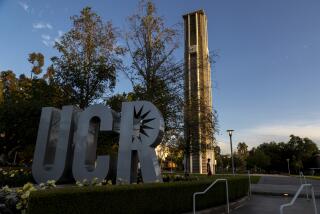Ted K. Bradshaw, 63; UC Professor Saw Military Base Closures as Opportunities
- Share via
Ted K. Bradshaw, a UC Davis professor who helped numerous California communities understand that the economic challenges associated with military base closures were generally not cataclysmic, died Aug. 5 while running near his Oakland home. He was 63.
The cause of death was believed to be a heart attack, a university spokeswoman said.
Bradshaw had spent two decades at UC Berkeley as an associate research sociologist before joining UC Davis in 1995. In June he became a full professor of community development at Davis and was known for his research on state energy policy and rural development as well as his analyses of base closures.
“He was a dominant voice in looking at the economic development implications of base closures,” said Josh Kirschenbaum, a former colleague at Berkeley who is now associate director of Policy Link, a nonprofit research group in Oakland. “When the state was fearing job losses and economic losses, he painted a picture of the potential of these places and demonstrated that development was possible.”
California was hit with the first of several rounds of military base closings in the late 1980s, and the affected communities feared dire consequences, including massive unemployment and declining home prices. Bradshaw’s studies provided cause for optimism.
“The bottom line is that base closure may not be the total catastrophe that many people think,” he told the Associated Press in 1995.
His main contribution was a handful of studies on Castle Air Force Base near Atwater in Merced County.
Bradshaw found that the community was able to absorb many of the civilian employees of the closed base and that opportunities for entrepreneurs opened up. Sales actually rose for some local businesses when military retirees, who formerly did all their shopping on the base, began patronizing local stores after the base closed in 1995.
On a wider scale, Bradshaw discovered that many bases had been so self-contained that their closures were barely felt in their local economies.
“Even fully operating bases have weak links to the community and the economy in which they are located,” he said in 1999.
The exceptions included small towns that had not diversified their economies or that had a large number of people employed on a base.
Bradshaw was a prolific researcher who helped reinvigorate the human and community development department at UC Davis by encouraging his students to examine topics of value to the communities in the school’s area.
“Ted worked hard to build a relationship between the university and the surrounding region. He totally raised the profile of the department,” said Stephen Wahlstrom, a longtime colleague and director of economics at Seifel Consulting in San Francisco.
Bradshaw was also known for his research on energy issues. He co-wrote, with Woodrow W. Clark II, “Agile Energy Systems: Global Lessons From the California Energy Crisis,” published in 2004.
More recently, Bradshaw had studied California’s enterprise zones, which offer tax incentives to improve economically distressed areas. He concluded that the program effectively promoted the hiring of disadvantaged workers, a major goal.
Bradshaw was born in Ely, Nev., and grew up in the Bay Area community of Walnut Creek. He earned a bachelor’s degree in sociology from Cal State Sacramento and a doctorate from UC Berkeley.
He is survived by his wife, Betty Lou, of Oakland; two sons, Niels of San Francisco and Liam of Oakland; his father, Ken, of San Francisco; two brothers; and a sister.
More to Read
Sign up for Essential California
The most important California stories and recommendations in your inbox every morning.
You may occasionally receive promotional content from the Los Angeles Times.














